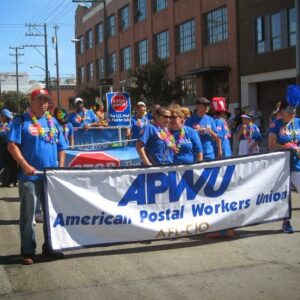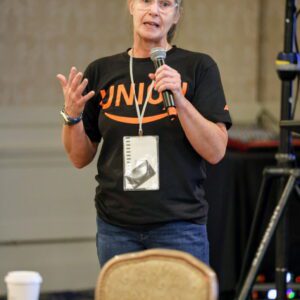April 18, 2005
APWU Drivers Will Continue to Press for Private-Sector Contracts
Approximately 170 APWU truck drivers who work for Mail Contractors of America have concluded their nearly three-week strike, going back to work for MCA in Des Moines, Kansas City, KS, and Jacksonville, FL, but vowing to press on for fair contracts.
The APWU-represented motor vehicle operators, back on the job April 11, are seeking an end to unfair labor practices and policies the privately-owned MCA imposed last September that reduced the pay of some of them as much as $10,000 per year. They held out the option to strike again if MCA refuses to bargain.
“We felt we had no choice but to strike,” said Tony Olson, an APWU steward and MCA employee in Des Moines. The company hired replacement drivers, he said, “but we made our point.”
MCA is one of the nation’s largest private mail haulers; its collective bargaining agreements in Des Moines and Jacksonville expired in September 2003 (Kansas City drivers are trying to negotiate a first contract). Among the conditions MCA imposed on workers in all three cities last fall was that it stopped paying a portion of health insurance premiums, forcing drivers to assume the costs if they wished to maintain their coverage.
The company also began denying the drivers pay for required rest breaks – breaks they were paid for in the expired agreements. “We were tired of working under the imposed conditions,” said Russ Gallion, president of APWU’s First Coast Local, which represents MCA truck drivers in Jacksonville. “When we saw that Kansas City and Des Moines went out, we decided to go out along with them.”
Another large private mail-haul firm, Pat Salmon & Sons, has returned to negotiations with APWU-represented drivers. Hundreds of drivers and their families had their eligibility for health insurance cut off March 1 by the company as a collective bargaining agreement lapsed.
The drivers, who work out of terminals in Arkansas, Texas, and three other states, had been paying as much as $11,500 a year just to be eligible for the company plan. The company refused to consider maintaining the insurance plan, for which it was paying less than 10 percent of the premiums for family coverage, and nothing at all for individuals. APWU representatives said that many contractual items had been agreed upon. A federal mediator was brought in to the talks in April.
“They are remarkably insensitive,” said Bill Manley, Support Services Division NBA and lead representative for the APWU bargaining team. “It clearly isn’t about the money. The company has not complained about costs; it simply doesn’t want to talk about healthcare problems.”
“The company has always been almost entirely dependent upon the Postal Service for its livelihood, and it’s been doing very well for more than 50 years,” Manley said.
The drivers won their first labor contract in September 2003, following three years of negotiations, the filing of unfair labor practice charges, and a short but successful strike. The agreement covered Salmon employees at terminals in Dallas, Fort Worth, Little Rock, Oklahoma City, Tulsa, Memphis and Shreveport.



